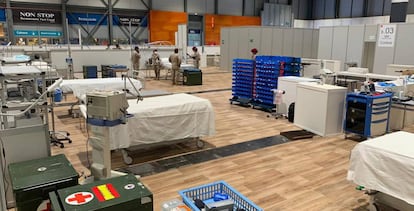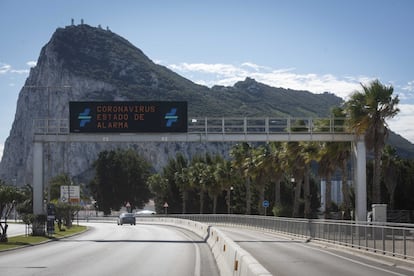Daily coronavirus deaths fall slightly in Spain but total infections exceed China’s
There were 812 Covid-19 victims in the last 24 hours, compared to 838 the day before. Health Ministry official Fernando Simón has tested positive for the virus

Official figures released on Monday by the Spanish Health Ministry showed that there were 812 deaths from the coronavirus in the last 24 hours, a slight fall from the previous day, which saw a new record of 838. The total number of coronavirus deaths in Spain since the health crisis began has now reached 7,340.
On Saturday the Health Ministry announced that there had been 832 deaths in 24 hours, and on Friday that figure was 769.
Since March 25 we have noticed a change in the trend, due to the confinement measuresHealth Ministry official María José Sierra
The ministry also stated on Monday that 6,398 new infections had been registered in the last day, bringing the total number of confirmed cases in Spain to 85,195. This figure is now above that of China, by around 4,000 cases. More than 46,600 Covid-19 patients have been hospitalized, of whom 16,780 have been discharged after recovering.
“The government is controlling the situation, it is dealing with the situation in the best possible way,” said Health Minister Salvador Illa at a news conference on Monday afternoon. Illa described the Monday figures showing a slight decrease in day-on-day deaths as “a ray of hope.”
The minister also said that the new rapid diagnostic tests will be tried out at the Carlos III public health institute before distributing them across Spain’s healthcare system. Last week a shipment of tests was returned to a Chinese manufacturer after it emerged that they were unreliable at accurately detecting positives.
On Monday, it was announced that Fernando Simón, the director of the Health Ministry’s Coordination Center for Health Alerts, and one of the government’s most visible faces during the crisis in Spain, had tested positive for the coronavirus. He was in isolation on Monday and did not appear as usual at the daily government press conference.
Speaking in Simón’s place at the press conference on Monday, his deputy, María José Sierra, pointed to a fall in the number of new infections since the state of alarm had been put in place and residents of Spain were confined to their homes more than two weeks ago. “Since March 25 we have noticed a change in the trend, due to the confinement measures,” she explained. She also pointed to the pressure on the country’s intensive care units (ICUs). “It is going to be important to reduce this pressure before we can think about deescalating the measures,” she said.
The deluge of patients requiring intensive care treatment is causing the Spanish Health Ministry to consider transferring coronavirus patients from overburdened regions such as Madrid and Catalonia to others with less strained healthcare systems, said Sierra.
A total of 12,298 health workers in Spain have been infected with the coronavirus
“Other regions are getting close [to the saturation point] and more ICU beds are being prepared,” she said. She added that respirators were being transferred to hospitals that needed them. “We are evaluating the need to possibly transfer patients too,” she said.
According to Sierra, a total of 12,298 health workers in Spain have been infected with the coronavirus. “Eighty-five percent of them are receiving treatment in their homes and are progressing well,” she said.
Sierra also provided the Spanish public with information about the use of masks. “Surgical masks are a barrier so that people who are infected do not transmit the virus,” she said. “Other masks have other uses. If you are walking in the street they are not necessary, there is no risk of contagion.”
Civil Guard chief José Manuel Santiago also explained on Monday that his force had stopped and identified 62,056 people and 2,100 vehicles on suspicion that they were breaking the country’s confinement rules. “Twenty-one people have been arrested, for resisting authority and disorder, and 4,600 police reports have been filed,” he explained. He also reported that a woman had been imprisoned in A Coruña, Galicia, after she had been arrested on a number of occasions for disregarding the rules of the state of alarm.
Economic fallout
The new restrictions introduced on Monday by the Spanish government, which confine all non-essential workers to their homes for a two-week period, is likely to cost the country €49 billion.
In one week, a country produces around 2% of its gross domestic product (GDP). If the first two weeks of confinement represented a 40% drop in economic activity and a further two weeks of even stricter measures raise that figure to 60%, that means that GDP will retreat by around four points over the course of the four-week period, equivalent to around €49 billion.
These figures are approximate, but in general they are in line with what has already been seen in China, as well as figures produced by the Organisation for Economic Cooperation and Development (OECD).
Funeral wakes
The government has also prohibited funeral wakes, either at funeral homes or inside private homes, in a bid to halt contagion of the coronavirus. The Health Ministry said that “given the special characteristics that surround the celebration of funeral ceremonies, it is difficult to ensure the application of containment and distancing measures with the necessary interpersonal separation of more than a meter that is needed to limit the spread of the virus.”
Up to three people will be allowed to be present at the burial or cremation of the deceased, as well as the official in charge of the ceremony. The ministry also decreed that while the state of alarm is in effect in Spain, the prices of funeral services cannot be higher than those prior to March 14, 2020, the day that the decree went into effect.
Second morgue

Also today, the Madrid regional government made a new provisional morgue available, in addition to the one that has already been installed in the city’s Palacio de Hielo ice rink. A building that was due to form part of the scrapped Ciudad de la Justicia (City of Justice) project has been converted into a space to store up to 230 bodies.
The Madrid government stated that this is a temporary and exceptional measure, to “facilitate the work of funerary services, to mitigate the pain of the families of the victims and alleviate the situation in the region’s hospitals.”
In the northeastern Spanish region of Catalonia, a total of 487 seniors who live in public and private residences have tested positive for the coronavirus. According to the Catalan department for social affairs, 119 senior homes have reported positive cases among their residents. There are 64,083 seniors living in the 1,073 residences in Catalonia.
On Saturday, a 28-year-old family doctor died on Saturday from the Covid-19 disease in a hospital in Ciudad Real, in the Castilla-La Mancha region. The young woman was asthmatic, and was working in a health center in Cuenca. She was the second coronavirus victim in the region in 48 hours, and the fourth physician to die during the crisis so far in Spain.
Gibraltar

The government of the British Overseas Territory of Gibraltar, which is located in the south of the Iberian peninsula, announced on Sunday that 65 coronavirus cases have been detected there so far. Four of those are currently in the hospital while 14 have recovered. Air traffic on The Rock, as Gibraltar is commonly known, has plummeted. From Monday to Friday of last week just 377 passengers were registered, compared to 2,809 during the same period last year, which is an 86.5% fall.
Since the start of the lockdown in Spain, Spaniards have been coming to their windows every day at 8pm to applaud the health workers and other employees who are on the frontline of the battle against the coronavirus. Since clocks went forward by an hour on Saturday, last night was the first occasion that this applause took place during daylight hours, permitting residents to get a clearer glance at their neighbors. Until this weekend, only the westernmost areas of Spain, in particular Galicia, were observing the 8pm applause in daylight hours.
With reporting by Antonio Maqueda, Jessica Mouzo, Juan Carlos Espinosa, Isabel Valdés, Jesús A. Cañas.
English version by Simon Hunter.
Tu suscripción se está usando en otro dispositivo
¿Quieres añadir otro usuario a tu suscripción?
Si continúas leyendo en este dispositivo, no se podrá leer en el otro.
FlechaTu suscripción se está usando en otro dispositivo y solo puedes acceder a EL PAÍS desde un dispositivo a la vez.
Si quieres compartir tu cuenta, cambia tu suscripción a la modalidad Premium, así podrás añadir otro usuario. Cada uno accederá con su propia cuenta de email, lo que os permitirá personalizar vuestra experiencia en EL PAÍS.
¿Tienes una suscripción de empresa? Accede aquí para contratar más cuentas.
En el caso de no saber quién está usando tu cuenta, te recomendamos cambiar tu contraseña aquí.
Si decides continuar compartiendo tu cuenta, este mensaje se mostrará en tu dispositivo y en el de la otra persona que está usando tu cuenta de forma indefinida, afectando a tu experiencia de lectura. Puedes consultar aquí los términos y condiciones de la suscripción digital.








































